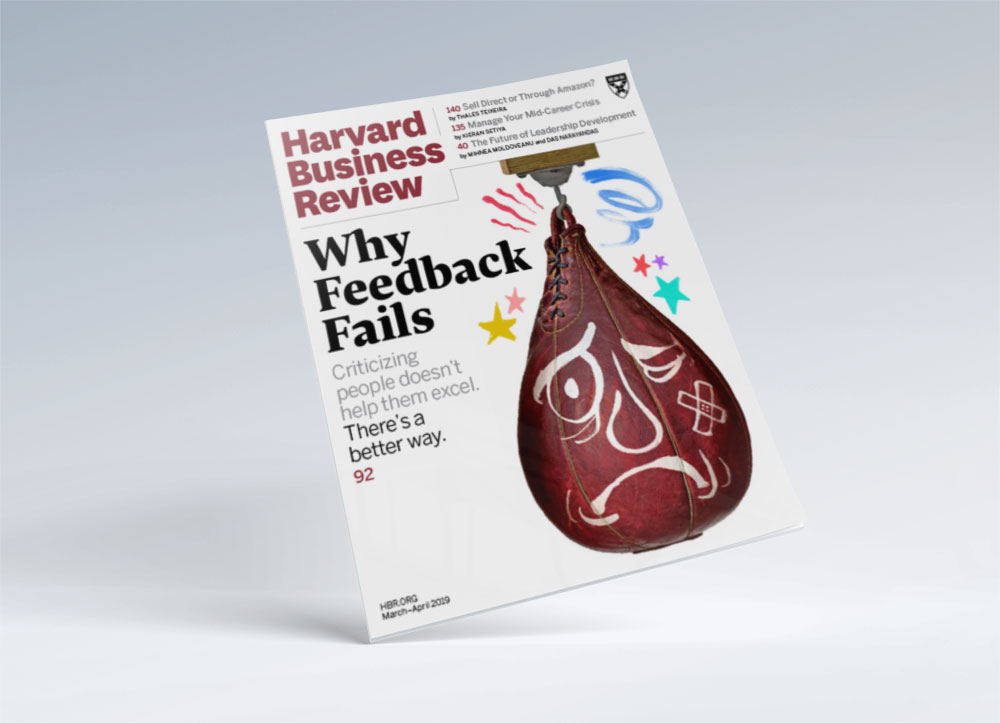
Who’s afraid of the HBR?

Who’s Afraid of the HBR?
The Harvard Business Review (HBR) is read by tens of thousands of business people around the world. Its articles cover a wide range of topics, are well written and interesting. I’m a subscriber but I don’t make the mistake of thinking that it’s about scientific accuracy, or that it’s completely unbiased. There’s an index called the impact factor that measures the importance and trust in the articles of a journal. The journal with the highest impact factor score is the Nature (38.1) and the lowest is the HBR (0.72).
What brings me to write this short piece is a recent article in the March-April issue of the HBR by Marcus Buckingham and Ashley Goodall called The Feedback Fallacy. It’s drawn from their book (incidentally, published by Harvard Business Review Press) called Nine Lies About Work which has a chapter entitled “Lie number 3 – people need feedback”.
That raised my hackles because both what the book and the article say about feedback is blatantly false.
Without feedback of some kind, performance can never improve. The logic is irrefutable: If you want to improve your performance at anything you need to know two things, (a) how you’re performing now (what you’re doing and what results you’re getting), and (b) what you need to do differently to improve. There are no exceptions to this rule.
(I declare an interest here. My company, Behavioural Science Systems Ltd. produces on-line performance improvement behavioural diagnostics that do the two things mentioned in the previous paragraph: (a) they identify the specific actions that individuals or groups are currently using to generate their results, and (b) they identify the situation-specific actions needed to improve that performance.)
My hackles rose even further because the authors deliberately scattered phrases like “research shows …” and “the research is clear…” through their article, but they declined to identify that research. That is because research does not say that feedback fails!
Nor does research support a number of other claims made by the authors. In fact, a vast body of research points to the opposite.
At the heart of the matter is what the authors say feedback is. They say feedback is “about telling people what we think of their performance and how they should do it better”, and that “my way is necessarily your way”. No, that’s not what feedback is about. The general consensus is that the feedback process is “a dynamic partnership between the giver and receiver based on “listening, trust, and awareness of the other person’s emotional state, context and surroundings … to facilitate learning and change”. [i]
The way the article is written is clever in that it sprinkles some facts that, although true, do not relate to what feedback is really about. For instance they say,
“all the research is clear: telling people what we think of their performance doesn’t help them thrive and excel, and telling people how we think they should improve actually hinders learning”.
Precisely. But that’s not feedback.
Here’s a second example. The authors talk about what they claim are three widely believed things that are in fact untrue:
- That “other people are more aware than you are of your weaknesses, and that the best way to help you, therefore, is for them to show you what you cannot see for yourself”.
- That “the process of learning is like filling up an empty vessel: You lack certain abilities you need to acquire, so your colleagues should teach them to you”.
- That “great performance is universal, analyzable, and describable, and that once defined, it can be transferred from one person to another, regardless of who each individual is”.
The technique being used by the authors in these instances is what is known as “anchoring a belief” in the mind of an individual that influences them to see the follow-up as representing truth. An example of anchoring a belief is when an individual opens a negotiation by saying something like, “I was going to ask for £9,000 but have decided to ask £7,000”. The £9,000 figure, untrue or deliberately misleading, is “anchored” in the mind and is very difficult to dislodge.[ii]
So having anchored various bits of misleading information in the reader’s brain, the authors then present you with something that you have been primed to believe is, at last, the truth about feedback. Here are some of the claims they make:
“The first problem with feedback is that humans are unreliable raters of other humans”.
In fact research shows that when people are given training, they can become good raters of other’s behaviour.[iii] [iv]
Using multiple raters, as in 360 feedback processes, has even poorer results – “all noise and no signal”.
But research shows that people can, and do, become good at giving effective feedback.[v] And it also shows that multi-source feedback (360) is effective.[vi]
I could go on, but suffice it to say, the article is at best nonsense and at worst deeply damaging. Feedback is essential to learning, growth and development.
– Robin Stuart-Kotze
[i] Bing-You, R., et. al., “The Feedback tango: An integrative review and analysis of the content of the teacher- learner feedback exchange”, Academic Medicine, volume 93, April 2018.
[ii] Bhatia, N, and Gunia, B. C., “I was going to offer $10,000 but …: The effects of phantom anchors in negotiation”, Organizational Behavior and Human Decision Processes, volume 148, 2018.
[iii] Uher, J., & Visalberghi, E., “Observations versus assessments of personality: A five-method multispecies study reveals numerous biases in ratings and methodological limitations of standardised assessments”, Journal of Research in Personality, volume 61, 2016.
[iv] Hauch, V.,et. al., “Does training improve the detection of deception? A meta-analysis. Communication Research, volume 43, 2016.
[v] Hardavella, G., et. al. “How to give and receive feedback effectively, Breathe, volume 4, 2017.
[vi] Lockyer, J. (2003). “Multisource feedback in the assessment of physician competencies” Journal of Continuing Education in the Health Professions, volume 23, 2003.

